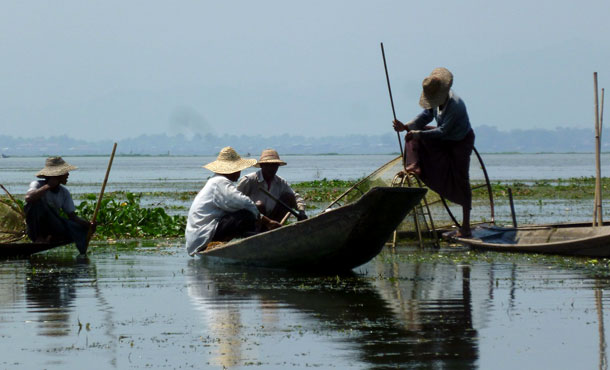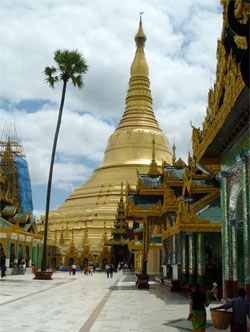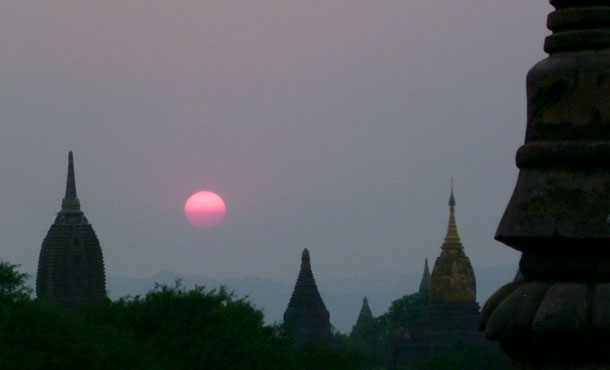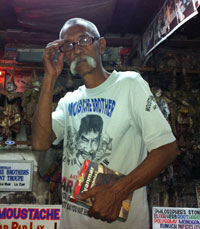The Daily Telegraph - Beautiful and damned
July 16, 2011
Following the advice of Aung San Suu Kyi, Burma's pro-democracy leader, Michelle Jana Chan travels around under her own steam.

Mya rubbed drops of water into the tree bark to form a yellow paste. She smeared it on my forehead and cheeks, finishing with the flourish of a dab at the end of my nose. The children jostling around me looked on, giggling. Their faces were also painted in elaborate yellow loops and circles and swirls. Applying thanaka pigment is a traditional beauty treatment in Burma, and it felt like a gift to be decorated like everyone else. I was spending the day in the home of Mya's father, 62-year-old Than, and his family, who live in a stilted house on Inle Lake, one of the country's most popular tourist sights. The lake is home to the Intha people, who are known for a one-legged rowing technique and for floating vegetable gardens that rise and fall with the water level. Some locals have also taken to opening up their homes to tourists.

Than welcomed me into his front room and we sat cross-legged on the rattan floor sharing plum cordial and boiled sweets while listening to his grandchildren sing "Baa Baa Black Sheep". We discussed the difficulty of sourcing clean water, how to tie the traditional longyi wraparound, his achievements in the sport of cane ball and the future of his family.
"We want more visitors," he said, as Moe, my guide, translated. "Tourism is good for boat drivers, for workers in restaurants and hotels; it is good for so many people."
Moe agreed. "We know what it is like to have no tourists. After [Cyclone] Nargis nobody came. No tourists and no work. Nothing to do except stay at home."
I explained that some Britons had chosen to keep away partly because of the reported opposition to tourism of Aung San Suu Kyi, Burma's pro-democracy leader, who last week made her first trip outside Rangoon since 2003. Until November last year she had spent most of the previous 20 years under house arrest while a military government ruled the country. She and her party were reported to have come out against tourism on the grounds that it would benefit the generals.
Neither man knew about Suu Kyi's reported stance. "I don't think she would say that," Than said, "and if she did I wish people had come anyway."
Moe was pensive. "It is difficult to hear you say that," he said to me. "Of course she is right and if tourists visit some money will go to the government. But even if that is as much as, say, 50 per cent, it still means 50 per cent is going to people like us. We say come. Come to Myanmar." (Most locals I met referred to the country as Myanmar. The British Government uses Burma – also insisted on by the Telegraph style guide – because the change of name to Myanmar was made by the former military regime. Its proxy political party, following far from free elections last November, dominates the current government.)
That tourists should come was the appeal of everyone I met who worked in tourism. Those I spoke to outside the industry were also eager to see foreign visitors. "We want to learn more about the world," one teacher said. "It is too expensive for us to travel, but we can 'travel' to other countries by meeting foreigners."
Tourism has risen sharply, especially from Thailand and China. Last year there was a record high of nearly 300,000 arrivals from abroad. That is a 30 per cent year-on-year increase, according to the Pacific Asia Travel Association, but still only about a 10th of the number of tourists drawn to neighbouring Laos.
Than and Moe had both noticed more tourists about, especially since the general election in November and the release of Suu Kyi. At that time the Nobel Peace Prize-winner commented again on tourism, saying that, while group visits were not to be encouraged, "individuals coming in to see, to study the situation in the country might be a good idea". The British Foreign Office says on its website that Suu Kyi "has recently indicated that she encourages ethical, individual tourism to help spread economic wealth in Burma, particularly to those outside of or not associated with the former military regime".
Burma is a straightforward and affordable destination for independent travellers. Clusters of small guesthouses and eateries have sprung up in tourist areas. English-speaking guides can easily be hired, and enough English is written and spoken for visitors to be able to get by. The country is crisscrossed with air, train, ferry and bus routes.
Flights can be expensive but other modes of transport are not. I made a four-hour journey by taxi for £60 (the car did break down but the driver fixed it). Clean, comfortable accommodation – on a par with a decent b & b but with Soviet-style furnishings – can be had for about £20 a night. Eating out is very cheap. The country is not only good value but a rewarding place to visit.
I flew in from Bangkok to the former capital, Rangoon (or Yangon), on a cool rainy day. In spite of grey skies I was feeling jubilant. After flight diversions and visa problems I had begun to doubt that I would ever find a way into the country. Consequently, I had made no plans beyond trying to get my passport stamped. I soon found myself at the city's best-known sight: the dazzling ancient temple of Shwedagon Paya, said to be built with 60 tons of gold. A procession of novice monks in pink satin and red lipstick was being carried on the shoulders of dowdy attendants through the temple's grounds. They filed past tables where a competition was taking place to carve watermelons into the most elaborate shapes.
Travel in Burma is as much about unexpected encounters as it is about tourist attractions. At National Bank Number Three I watched a man wheel inside a trolley loaded with what looked like mattresses. On closer inspection I realised they were sewn-up sacks stuffed with kyat, the local currency. Written in black marker pen on the outside was "USD250,000". I estimated a sack's dimensions and compared it to the wad of kyat I had exchanged for $100 (£63). It was about right: a "mattress" of kyat would equate to about a quarter of a million dollars. It was more cash than I had ever seen – on a bank floor in Burma.
Yet Rangoon felt squeezed by sanctions – imposed in varying degrees by the West for more than 10 years and recently extended by the European Union and the United States. More than anywhere the city reminded me of Havana for its crumbling colonial buildings, potholed roads, creaking taxis, poorly stocked supermarkets and abundance of generators (in readiness for the regular blackouts). At night, only a few street lamps glowed in the darkness.
Exploring the town, I wandered through a broken gate into the National Stadium. Some well-toned athletes sprinted around the cinder track. A short old man with a big grin introduced himself and turned out to be a trainer of the national athletics team. He pointed out his protégé as she ran past.
He then told me about the bronze medal he had won at the Asian Games a half-century earlier, crediting his success to his training in China. To an even greater degree today China is considered the regional superpower. I met a few people who were worried about the growing influence of their bigger neighbour, but many more were glad of the trade.

The following afternoon I boarded the train to Bagan. I had paid for an upper-class sleeper with a $50 bill that the conductor did not put in the till but folded into his shirt pocket.
The train was old-fashioned, as were the friendly staff, in faded uniforms and carrying sheaves of carbon-copies. There were four bunks in my compartment with pillows and blankets. Ordinary class was less than ordinary, with rigid upright banquettes for the overnight journey. We pulled out punctually. I threw open a window as we left the city behind. Pagodas topped the hills; some with spires covered in gold leaf, some in white plaster, some decorated in fragments of broken mirror. White Brahman cows dozed under mango trees. At station platforms women on the tracks sold fried samosas and apples; children called out to me for dollars and sweets.
Overnight the train swung, shook and shuddered as it moved north. I woke parched. The air was dry with a whiff of burning plastic, and outside the landscape had been transformed. Lush paddy fields had made way for dusty scrubland studded with palms. Piles of rubbish lay rotting by the tracks. Through the frame of my train window Burma rolled past like a film about Old Asia and broken dreams.
By breakfast I was in Bagan, the country's architectural masterpiece, with a concentrated 4,000 temples, pagodas and stupas on the banks of the Irrawaddy. It was in the 11th century that rulers here began 200 years of frenzied construction and created this exquisite spiritual landscape reflecting Buddhist, Hindu and animist history.
I rented a bicycle for a pound a day. For an archaeological site of such stature there are strikingly few tourists, and those who come focus on a few of the larger temples.

The remainder lie empty. Monks in raspberry-coloured robes shuffled by. English-speaking locals offered their services as guides, and artists peddled rolled-up canvases depicting Buddhist imagery. Peering into the gloom of the temples I glimpsed colourful frescoes and sensuous statues. Then I climbed steep staircases up tiers of terraces for spectacular views across the dusty plains.
My next journey was a slow boat to Mandalay, something I have dreamed about since I could first read. This was the last sailing of the season of the Bagan ferry to Mandalay, and there were only 11 passengers rather than the usual 100-plus. We all stood on deck looking eastwards waiting for the first chink of sunrise. The river level was low and we snaked upstream avoiding sand banks.
The 1,300 miles of the Irrawaddy are plied by barges carrying logged teak, paddle steamers carrying well-heeled tourists and fishermen flinging out nets from makeshift sailing boats. We passed squat villages and tented communities of nomadic river gipsies on the sandy floodplains. Passengers shared snacks and books and small talk. There was a Slovakian notching up countries and pestering me to count my tally; a softly spoken Malaysian engineer who worked for Myanmar Airways; and an Irishman who was already sunburnt but sat out in the open, shirtless, all day.

One of the crew took me up to the bridge where I found three men who all called themselves captain. One was listening to the BBC World Service on his hand-held radio. When I showed interest, another tuned into the station on the boat's radio and the entire cabin was filled with those familiar BBC pips. The third captain gave me a thumbs-up. "Tell your friends to come," he said. "If there are more tourists, we will have more business."
Mandalay, I discovered, was not the place I had read of in my storybooks. Lined with new shopping malls and uninspired apartment blocks, it is now the modern commercial hub of the north, with strong trade links to China and India. Roads are congested; scooters are laden with families, the children seated on handlebars. I balanced on the back of a bicycle-rickshaw trying to snatch glances of a bygone era: a colonial-style clock tower; the moat of Mandalay Palace; a shop selling monks' robes.
That night I went to see a slapstick comedy show, Moustache Brothers, an unlikely tourist attraction staged by a trio who openly mock the government. Against a backdrop of colourful signage flashing "FBI", "Mossad" and "International Criminal Court", 60-year-old Lu Maw pointed to a Swiss tourist. "Your country rich," he said. "Because your banks full of our generals' money."

The authorities seem to tolerate the show, perhaps because it is performed in English only. Par Par Lay held up a sign reading "3 time arrested. Jailbird. Black List" and posed for photographs wearing handcuffs. "Go to the dentist in Thailand because you are not allowed to open your mouth here," Lu Maw said.
In between the gags were spoof traditional dances. The spectacle felt more sad than funny, but we all chuckled at punchlines, if only to honour the courage in the room. Lu Maw, the only one who has not been locked up, believes it is fame that will keep him free. "Tell everyone to come see us, yeah," he said. "I say more tourists, better for Myanmar. Generals get visa 30 dollars but we get more business too."
I took a four-hour taxi ride through the rolling hills of the Shan State, a prosperous area abutting the Chinese border. Even the smallest village had whitewashed homes, new fences and orderly gardens. The boom in business was confirmed by a German entrepreneur I know who had lived in south-east Asia for decades and founded a vineyard at Aythaya, near Inle Lake: he cannot produce enough wine to meet domestic demand. In the evenings the vineyard's restaurant was abuzz with local businessmen ordering wine on the terrace overlooking the lights of the trading post of Taunggyi.
Towards the end of my trip I flew to Ngapali beach on the Bay of Bengal, where there are miles of golden sand yet limited tourism development. The hotels were quiet; only a couple of restaurants had customers. It reminded me of Thailand in the Eighties when life was slower and sweeter.
Whether Britons come or not, tourism here will grow. Today Asians make up about two thirds of arrivals – they are nearly three times as numerous as Europeans – and the tourists I spoke to from Malaysia and Hong Kong had no qualms about visiting.
The decision to come remains a very personal one. If you are considering a trip, you should know that it is impossible to visit without putting some money in government hands. You need to buy a visa, hotel bills include government tax and tickets are required to enter state-administered archaeological zones, such as the wondrous Bagan.
There are, however, also ample opportunities to put money in the pockets of individuals working in tourism, and to meet and talk to locals – encounters that became the highlight of my trip. The people of Burma are the country's greatest asset; they are warmly welcoming and refreshingly open. No ticket is required to make new friends.





